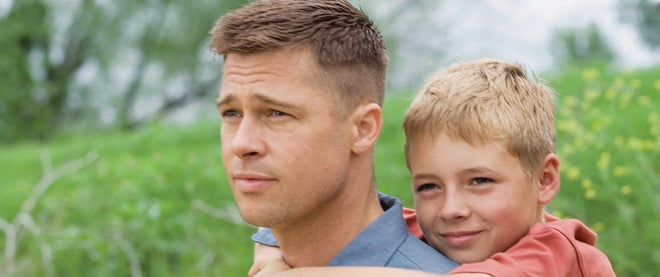What keeps Brad Pitt awake at night?
The ‘Tree of Life’ star talks about being a dad, and playing one for the mysterious Malick
The most complex role of his career: ‘This is a man who feels he can’t get ahead and everyone is doing better than him,’ says Pitt
Share

In a recent tweet, Steve Martin announced that he was “starting a massive new media campaign to promote the idea that I am ‘famously shy.’ ” Was Martin making a Terrence Malick joke? Hard to say. But that oxymoronic phrase “famously shy” has been attached to Malick’s name a lot lately, ever since the legendary American director shunned the red carpet in Cannes, snuck into his own premiere unnoticed, and didn’t show up to accept the Palme d’Or for The Tree of Life. The movie’s famously famous star, Brad Pitt, along with almost-famous co-star Jessica Chastain, were left to defend and explain their Oz-like wizard to the press, protecting the 67-year-old director as if he were an ultra-sensitive, strangely gifted child. “He’s one of the most humble men you’ll ever come across,” said Pitt, holding court for a group of journalists in a penthouse suite of the Carlton Hotel in Cannes. “He’s a very special man, very sweet—until you get a ball or bat in his hand, and then he’s very competitive.”
Although he’s made just four other movies in four decades (Badlands, Days of Heaven, The Thin Red Line, The New World), Malick has carved out a singular mystique as the epic poet of American cinema. His films have always doted on nature, with an eye for transcendental wonder. But The Tree of Life goes further. Set mostly in a ’50s Texas suburb, it’s a nostalgic reverie about three boys being raised by a strict father (Pitt) and an angelic mother (Chastain). But its narrative is submerged by wave upon wave of rapturous images. With just traces of dialogue, it unfolds almost entirely as montage.
The film is like a marathon trailer for itself—a symphony of images set to inspirational music and prayerlike voice-over. Midway through, Malick pauses to enact the creation of the universe with a spectacle that plays like a beatific antidote to the cosmic chill of Stanley Kubrick’s 2001: A Space Odyssey. Malick is the anti-Kubrick. Instead of playing God, he fishes for divinity in glimmers of sunlight, wind and emotion, building a grand canvas from tiny, random moments.
If ever a film cried out for a word from its maker, this is it. But in Cannes we had to rely on Pitt the apostle to explain the meaning of Malick: “He has this focus on the bigger questions, this very strong relationship with God, his idea of God,” said the actor, who was more helpful in detailing Malick’s method of capturing happy accidents on the set. “There are no lights. There’s one guy with a camera. We’re free to go anywhere we want. The kids aren’t allowed to read the script. They have a closet for their clothes and decide what they want to wear that day.” When it’s suggested that Malick is a perfectionist, Pitt says, “Actually it’s the opposite. He’s an imperfectionist. He’ll push a cameraman before a take, or throw a dog into the front seat when we’re driving. He’d call it torpedoing a scene.”
“There’s no ego with him,” said Chastain in a separate interview, comparing Malick’s troupe to “an ensemble that breathes together, a ballet company where there is no soloist.There was so much joy. ‘Oh, we’re watercolouring today! We’re playing in the sprinkler!’ ” As a “perfect and compassionate and forgiving” mother, Chastain’s job was to embody grace. At one point, she had to deliver a monologue about grief, and after many takes, Malick asked her to try it without words. “That was a little scary,” she says. “Then I tried it, and it was so freeing.” She ended up performing most of her scenes in silence, but later voiced most of the film’s ethereal narration.
Pitt gets to be more vocal as a father losing his grip on the American dream—easily the most complex role of his career. “This is a man who feels he can’t get ahead and everyone is doing better than him,” says Pitt. That sounds like a stretch. But Pitt insists his life is more ordinary than you’d think: “We make breakfast like everyone else and it’s chaos and pancake batter splattered all over the place, and bath time at night. Ultimately, I’m a dad. I have the concerns a dad has. Is everyone safe? Am I spending enough time with them? These are the things that keep me awake.” What about his director? Who knows? The Malick mystique remains safe.